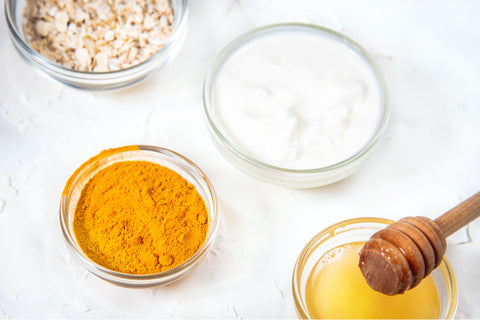We've all tried different lotions, skin actives, and peptides to make our skin glow and healthy. Most chemical-based cosmetics rob our skin of natural oils, providing immediate light but at a high expense. During this rat rush, we need to remember the natural components in our kitchen. One such component is turmeric, often known as haldi.

Turmeric can impart a glow to dull skin, treat Acne, brighten skin, and battle early indications of aging, such as fine lines and wrinkles. It is a versatile skin healer high in antioxidants. Add it to your skincare regimen and watch the magic unfold. Read on to learn how turmeric powder for skin can be used to make a variety of homemade face masks.
Benefits Of Turmeric Face Mask For Oily Skin
Turmeric powder is antibacterial and antiviral, which means it can help you eliminate infections, and its antioxidants can make your skin sparkle. Let's look at the other benefits of turmeric for oily skin.
- Skin Whitening Properties: Turmeric is thought to be a powerful herb for skin whitening and showing radiance. It is a potent antioxidant that can help eliminate dark spots, blemishes, and hyperpigmentation.

- Turmeric, or haldi, is often used in Indian wedding ceremonies. It is done to give your skin a natural shine on your special day. Turmeric's antioxidant and anti-inflammatory effects add shine to your skin, rejuvenating it with a natural glow.
- Reducing Acne: Cutibacterium acnes bacteria can produce lesion-type Acne on the skin. Turmeric can effectively treat this sort of acne eruption. According to one study, the active component of turmeric, curcumin, has powerful antioxidant capabilities that can help combat Acne vulgaris. Turmeric's anti-inflammatory properties help to lessen skin inflammation and eventually heal it.
- Soothes Sensitive Skin: Turmeric contains anti-inflammatory, antimicrobial, and antioxidant properties that can benefit the skin in various ways. Turmeric has been shown to aid with eczema, psoriasis, Acne, and wound healing. Turmeric's antimicrobial characteristics help to balance sebum products, eradicate germs, and are gentle on sensitive skin.

- Experts even propose that turmeric can help treat face psoriasis. Turmeric is antimicrobial and anti-inflammatory, so it can kill the bacteria that cause psoriasis while also reducing skin inflammation.
- Reduces Dark Circles: Dark circles around the eyes are a frequent skin issue. A lack of sleep, improper eating, hyperpigmentation, or excessive computer or mobile phone use can cause dark circles under the eyes. Turmeric can help in this situation. As a lightening agent, turmeric benefits your skin by lowering the appearance of dark circles and increasing circulation, both of which reduce puffiness and lighten the area around your eyes.
- Slows Down Skin Aging: UV radiation and environmental pollution are common sources of exposure for your skin. It disrupts the skin's natural oil balance, causing your skin to lose suppleness, resulting in aging symptoms such as fine lines, wrinkles, and age spots.

- Similarly, free radicals harm your skin cells and accelerate the aging process. Typically, the aging indications show around the eyes, forehead, and neck. Curcumin, a strong antioxidant component, stimulates collagen formation and improves skin suppleness.
Top 5 DIY Turmeric Face Mask Recipes For Oily Skin
Turmeric has been used for ages as a skin care cure; here are some current versions of old recipes for you to try. Continue reading to learn how to make a DIY turmeric face mask for oily skin.
Recipe 1. Turmeric With Besan Mask For Oily Skin
Turmeric has anti-acne and anti-fungal properties, which clears the skin by removing Acne and infections and evens and brightens it. Whereas besan holds all ingredients together, rosewater is antimicrobial and can be used to form a mask.

Ingredients
- Besan - 2 Teaspoons
- Wild Turmeric Powder - 1 Teaspoon
- Rosewater - 3 Teaspoons
Directions
Step 1: In a small bowl, combine turmeric powder, besan, and rosewater.
Step 2: Stir all of the ingredients together to make a fine paste.
Step 3: Before you use this paste, make sure your face is damp.
Step 4: Apply the paste evenly on your skin and allow it to dry for 15 minutes.
Step 5: Rinse it with normal water.
Step 6: Use twice a week for optimum impact.
Recipe 2. Coffee Mask For Oily Skin
While coffee is mostly an energy drink, it also establishes a reputation as a skin saver. It contains antioxidants, which help fight free radicals that cause skin damage. Conversely, turmeric has antimicrobial characteristics that effectively treat Acne and outbreaks. Combining these substances with curd can provide an excellent face mask for oily skin and Acne.

Ingredients
- Dry Coffee Powder- 1 Tablespoon
- Turmeric Powder - 1 Tablespoon
- Curd - 1 Tablespoon
Direction
Step 1: Combine two tablespoons of ground coffee powder, some turmeric powder, and two tablespoons of curd.
Step 2: Stir well to form a smooth paste.
Step 3: Apply it to a clean face and leave for 10 minutes.
Step 4: Rinse with cold water and enjoy a clean, oil-free look.
Step 5: For the greatest results, use this face mask twice per week.
Recipe 3. Aloe Vera Face Mask For Oily Skin
With aloe vera's numerous benefits, calling it a miracle gel would be an understatement. It has great anti-inflammatory and antibacterial characteristics that assist in soothing your skin, and combining it with honey yields one of the greatest night face treatments for oily skin.

Ingredients
- Multani Mitti - 2 Teaspoon
- Yogurt - 1 Teaspoon
- Aloe Vera Gel - 1 Teaspoon
- Turmeric Powder - 1 Teaspoon
Directions
Step 1: Mix thoroughly with Multani Mitti, turmeric, and yogurt in a bowl.
Step 2: Add Aloe Vera gel and mix once more until you have a smooth and fine paste.
Step 3: Apply this paste evenly over your face and leave it on for 15 minutes.
Step 4: Wash your face with lukewarm water and pat dry.
Step 5: Use three to four times each week for greatest results.
Recipe 4. Gram Flour And Yogurt Face Mask For Oily Skin
Gram flour is extremely effective for curing oily skin. It contains oil-absorbing qualities and thoroughly cleans your pores. Its alkalizing capabilities maintain your skin's pH levels in harmony. Mixing gram flour and yogurt is an age-old home medicine passed down through generations.

Ingredients
- Gram Flour - 1 Tablespoon
- Yogurt - 2 Tablespoons
- Turmeric Powder - ½ Teaspoon
Direction
Step 1: Mix the gram flour with two tablespoons of yogurt and whisk thoroughly.
Step 2: For added advantages, add a pinch of turmeric powder to the paste.
Step 3: Apply it to your face and let it dry.
Step 4: Rinse thoroughly with warm water and pat dry.
Step 5: Use this turmeric face mask twice per week.
Recipe 5. Sandalwood And Haldi Face Pack For Oily Skin
Sandalwood and turmeric are good oil absorbers, helping regulate excess oil production while leaving skin soft and smooth. Sandalwood contains antioxidants that decrease dryness and promote skin suppleness.

Ingredients
- Sandalwood Powder - 1 Tablespoon
- Turmeric Powder - ½ Teaspoon
- Rose Water - 2 Teaspoon
Directions
Step 1: Place one Teaspoon of sandalwood powder in a bowl and add a pinch of turmeric powder.
Step 2: Make a fine paste by adding rose water and mixing thoroughly.
Step 3: Apply to your face and allow 15 minutes.
Step 4: Wash with cold water.
Step 5: To get the best effects, use this DIY mask twice a week.
Conclusion
So, what recipes do you like the most and plan to try? Turmeric is extremely beneficial to overall health. It can help increase your immunity and soothe your skin. It improves both infections and skin complexion. You can use any turmeric and even produce your powder from raw turmeric, but for the best cosmetic-grade turmeric powder, visit www.VedaOils.com and save money on your purchase.












 Sign in
Sign in Register now
Register now My Reward Points
My Reward Points









